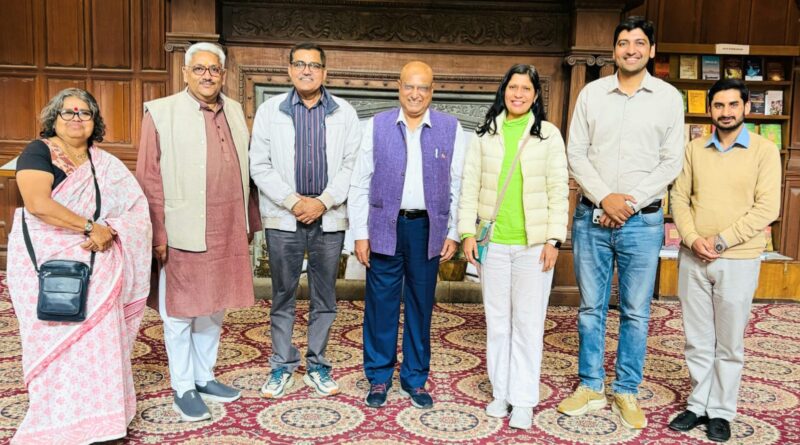Spiritual Intelligence Must Be Prioritized in Academic Leadership: Prof. M.M. Goyal at IIAS Shimla
“Spiritual Intelligence (SI) is more essential than Artificial Intelligence (AI) to achieve the goals of Need-based Governance in academic leadership,” said Prof. Madan Mohan Goyal, Visiting Professor at the Indian Institute of Advanced Study (IIAS), Shimla, and former Vice-Chancellor of three universities. Prof. Goyal, a retired professor from Kurukshetra University and the founder of the Needonomics School of Thought, made this statement during the second session of the lecture series on “Academic Leadership for Need-based Governance in Institutional Management.”
The session was chaired by IIAS Fellow Prof. J.K. Rai, who introduced Prof. Goyal. The event was attended by Secretary Shri M.C. Negi, ARO Shri Prem Chand, Shri Hem Raj, National Fellows, Tagore Fellows, Fellows, Guest Fellows, IUC Associates, and resident scholars, reflecting the active academic engagement at IIAS.
Prof. J.K. Rai described Prof. Goyal’s lecture as a high-quality, innovative model for academic governance, inspired by the Gita’s concept of “Swadharma” (one’s righteous duty). He emphasized the idea of “not just commitment, but self-aware devotion” and cited Lord Rama as an epitome of disciplined service to society.
Prof. Goyal stressed that alongside technical expertise, self-realization, values, and ethical decision-making are indispensable in today’s education system.
“Artificial Intelligence can provide information, not judgment. Judgment comes from wisdom, and wisdom arises from spiritual consciousness. Unless leadership is self-reflective, it cannot determine a welfare-oriented direction for society,” said Prof. Goyal.
He clarified that AI should play a supportive role, not a decisive one in leadership decisions. Educational leadership must adhere not just to technology but to the principles of truth, service, and balance.
In his lecture, Prof. Goyal referenced Indian philosophy, the Bhagavad Gita, and cultural consciousness, stating, “Holistic leadership emerges only through the harmony of mind, intellect, and soul.”
He emphasized the need for a clear Public-Private Partnership (PPP) model based on Need-based Governance to overcome challenges in implementing the National Education Policy (NEP). Such a model, he said, would align NEP with Need-based Education and ensure Need-based Employment.
Prof. Goyal advocated for Gita-inspired Needonomics to enhance the effectiveness and efficiency of academic leadership.
He also remarked that even in matters like “playing with paperweights,” empowerment and self-awareness are necessary, achievable only through a decentralized approach.
Calling for a new narrative in academic leadership based on collaboration rather than competition, Prof. Goyal urged educators to be fearless, courageous, and enthusiastic.
He further stated that teachers and administrators must become STREET SMART (Simple, Moral, Responsive, Ethical, Action-oriented, Responsible, and Transparent). The audience engaged in an in-depth discussion with Prof. Goyal during the Q&A session following the lecture.



